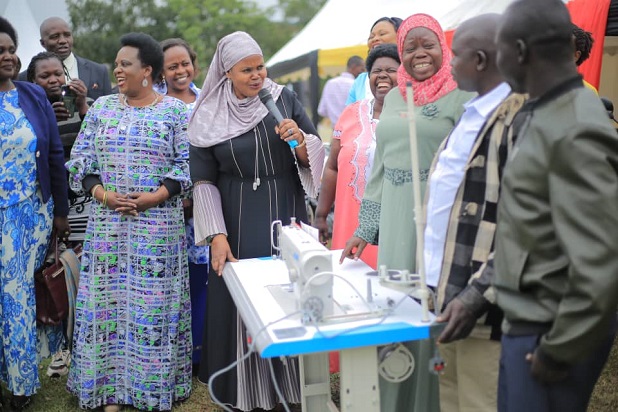The Government of Uganda has given out business toolkits and equipment to 66 groups working in the informal sector, also known as the Jua-Kali sector. The handover event was held at Kololo Independence Grounds and was led by Honourable Esther Davinia Anyakun, Minister of State for Labour, Employment and Industrial Relations, under the Ministry of Gender, Labour and Social Development.
The initiative is part of Uganda’s broader plan to help informal workers become part of the formal economy. A total of 1,417 beneficiaries—900 women and 517 men—from 29 districts across the country received the tools under the Supporting Jua-Kali Enterprises to Transition into the Formal Economy (SENTE) Programme.
Speaking at the ceremony, Minister Anyakun said: “The Government of Uganda is investing in you. This equipment is not meant for personal use but for your groups as stated in the Memorandum of Understanding you will sign.” She urged all beneficiaries to handle the tools with care and use them for business growth.
The SENTE programme was launched to improve job creation, increase productivity, and help small, informal businesses operate legally. Since it started, it has supported 781 groups across nine previous cohorts, with nearly 24,000 beneficiaries reached. Over 56% of those supported so far have been women.
Minister Anyakun said the programme is critical because Uganda is battling challenges like unemployment, low skills, and poor labour productivity. According to a 2021 report from the Uganda Bureau of Statistics, 41% of youth aged 15 to 29 were not in employment, education, or training (NEET). She added that 92% of people who are working in Uganda do so in the informal economy, which currently contributes about 52% to the national GDP.
However, despite the size and importance of this sector, Jua-Kali workers still face many problems such as lack of startup capital, limited access to training, and no tools or equipment. Minister Anyakun stressed that while the SENTE programme is already showing results—like better productivity and higher incomes—there have also been cases where beneficiaries misused the equipment.
“We know some groups received the toolkits but failed to use them properly. Some even went silent. We are putting in new measures to check such misuse and improve monitoring,” she said.
The Minister also used the platform to thank President Yoweri Museveni and Members of Parliament for approving funds to support the programme. She called on community leaders and local government officials to continue helping in mobilising and guiding beneficiaries in their areas.
Going forward, the government plans to increase field monitoring and expand the reach of the programme so that more Jua-Kali workers across the country can benefit. The broader aim is to push Uganda closer to its national goal of socio-economic transformation through inclusive and sustainable employment opportunities.
The equipment given out includes welding machines, carpentry tools, sewing machines, hairdressing kits, bakery ovens, and other trade-specific machines. All recipients are required to operate in groups and are expected to register their businesses, pay taxes, and follow formal procedures over time.
With this latest distribution, many of the beneficiaries say they are ready to start work, earn better incomes, and reduce their dependence on handouts or unstructured hustling.
